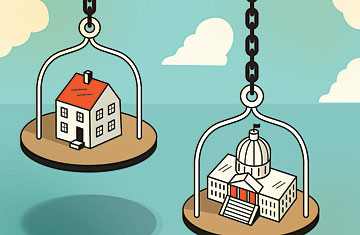
Folksy politics is always difficult to counter successfully, in part because it has such strong emotional appeal. Consider the hoopla over raising the U.S. federal debt ceiling and the Republican efforts to pass a balanced-budget amendment to force the U.S. to make whatever spending cuts are required to get into the black and stay there, year after year.
The conservatives pushing this "cut, cap and balance" plan have a very powerful and easy-to-digest sales pitch: since no individual household can continually spend more than its income, why should the federal government be able to? It's a compelling question, especially if you look at the federal government's budget the same way you would look at your family's. At that point, you would realize that this year, you are spending about $41,500 more than the $55,000 you will make. (That's the ratio by which the federal government is in the red.) Time to gather everybody around the dinner table for a very serious talk.
But the macroeconomy doesn't work like the microeconomy, and there's a good reason why. It's called the paradox of thrift, which was first elucidated by British economist John Maynard Keynes. The idea is simple: while you and I as individuals can improve our financial position by saving, society as a whole often cannot — especially during times of recession and sluggish economic growth, like now. That's because when we all decide to start saving, nobody shows up at the shops to spend. Consumption, which accounts for about 60% of all economic activity in the U.S., goes down, and consequently so do incomes and employment. It's news to no one that this is exactly what has been happening. Amazingly, after two years of economic "recovery," unemployment isn't falling but rising.
In Keynesian theory, this is exactly the time that government has to step into the fray and spend, even if it has to borrow to do so. That's what the Obama Administration did in the wake of the financial crisis, and most economists agree that things would have been a lot worse if it hadn't.
But consider what would have happened if there had been a balanced-budget rule in effect at the deepest point of the recession. Such a rule would have required the government to make $424 billion in spending cuts, which the left-leaning Economic Policy Institute estimates would have reduced economic output by 4.2%, resulting in 5 million more lost jobs and an unemployment rate of over 10%. Recessions, of course, mean lower tax revenue, which also means a higher deficit. Aside from slashing expenditures, the only other way the government could have met a legal requirement to balance the budget would have been to broadly raise taxes when the tax take was falling and unemployment was rising.
You don't have to be a student of Keynes to understand that this would have been economic suicide. And economic crises aren't the only times you need deficit spending. It helps in wartime too. The U.S. couldn't have won World War II with a balanced-budget amendment.
Despite the simplistic "treat the federal government like a family" arguments put forward by some politicians and pundits, plenty of experts on both sides of the political fence say a balanced-budget rule is downright silly. "It's about the most irresponsible action imaginable," says Norman Ornstein, a resident scholar at the conservative American Enterprise Institute. "It would virtually ensure that an economic downturn would end up as a deep depression by erasing any real ability of the government to pursue countercyclical fiscal politics and in fact demanding the opposite at the worst possible time."
Still, whether or not you buy that the federal government is like a family, many states have balanced-budget rules. That is yet another reason the federal government shouldn't — so it can be the economic stimulator of last resort. The deep cuts and tax increases that many states are enacting right now as a result of their balanced-budget requirements are "damaging payroll growth and consumer spending and generally having a negative impact on GDP growth," says Yelena Shulyatyeva, an economist at BNP Paribas in New York City. State and local governments fired 87,000 workers during the second quarter of this year, up from 78,000 in the first, and the cuts will only accelerate this summer.
That brings to mind another piece of simple Keynesian wisdom: "If Enterprise is afoot, wealth accumulates, whatever may be happening to thrift." The only way to truly get the U.S. economy back on track is to end this myopic focus on what to cut and start focusing on what to grow — and so find the jobs that will help Americans start spending again.
